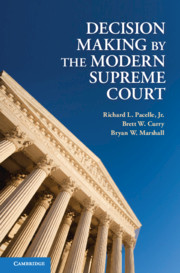Crossref Citations
This Book has been
cited by the following publications. This list is generated based on data provided by Crossref.
Broughman, Brian J.
and
Widiss, Deborah A.
2014.
After the Override: An Empirical Analysis of Shadow Precedent.
SSRN Electronic Journal,
Marshall, Bryan W.
Curry, Brett W.
and
Pacelle, Richard L.
2014.
Preserving Institutional Power: The Supreme Court and Strategic Decision Making in the Separation of Powers.
Politics & Policy,
Vol. 42,
Issue. 1,
p.
37.
Broughman, Brian J.
and
Widiss, Deborah A.
2015.
After the Override: An Empirical Analysis of Shadow Precedent.
SSRN Electronic Journal,
Christenson, Dino P.
and
Glick, David M.
2015.
Chief Justice Roberts's Health Care Decision Disrobed: The Microfoundations of the Supreme Court's Legitimacy.
American Journal of Political Science,
Vol. 59,
Issue. 2,
p.
403.
Bartels, Brandon L.
and
O'Geen, Andrew J.
2015.
The Nature of Legal Change on the U.S. Supreme Court: Jurisprudential Regimes Theory and Its Alternatives.
American Journal of Political Science,
Vol. 59,
Issue. 4,
p.
880.
Evans, Michael C.
Cates, Cynthia L.
and
McIntosh, Wayne V.
2015.
The Reality of Jurisprudence(?): Interpretive Methods in the Opinions of Justices Antonin Scalia and Stephen Breyer.
Justice System Journal,
Vol. 36,
Issue. 1,
p.
20.
Eshbaugh‐Soha, Matthew
and
Collins, Paul M.
2015.
Presidential Rhetoric and Supreme Court Decisions.
Presidential Studies Quarterly,
Vol. 45,
Issue. 4,
p.
633.
Badas, Alex
2016.
The Public's Motivated Response to Supreme Court Decision-Making.
Justice System Journal,
Vol. 37,
Issue. 4,
p.
318.
Black, Ryan C.
and
Owens, Ryan J.
2016.
Courting the President: How Circuit Court Judges Alter Their Behavior for Promotion to the Supreme Court.
American Journal of Political Science,
Vol. 60,
Issue. 1,
p.
30.
2016.
Toward an Informal Account of Legal Interpretation.
p.
104.
Carman, Raymond V.
2017.
Making Good Law or Good Policy?.
p.
1.
Bagashka, Tanya
and
Tiede, Lydia
2018.
Explaining dissensus on the Bulgarian constitutional court.
East European Politics,
Vol. 34,
Issue. 4,
p.
418.
Pacelle, Richard L.
Scheb, John M.
Sharma, Hemant K.
and
Scott, David H.
2018.
Assessing the Influence of Amicus Curiae Briefs on the Roberts Court*.
Social Science Quarterly,
Vol. 99,
Issue. 4,
p.
1253.
Ip, Eric C.
2019.
Hybrid Constitutionalism.
Glennon, Colin
and
Strother, Logan
2019.
The Maintenance of Institutional Legitimacy in Supreme Court Justices’ Public Rhetoric.
Journal of Law and Courts,
Vol. 7,
Issue. 2,
p.
241.
Masood, Ali S.
and
Kassow, Benjamin J.
2020.
The Sum of its Parts: How Supreme Court Justices Disparately Shape Attention to Their Opinions.
Social Science Quarterly,
Vol. 101,
Issue. 2,
p.
842.
Collins, Jr., Paul M.
and
Eshbaugh-Soha, Matthew
2020.
The President and the Supreme Court.
Huang, David K. C.
2020.
US foreign policy regarding the defence of Taiwan: a critical analysis in accordance with US law.
Asian Journal of Political Science,
Vol. 28,
Issue. 3,
p.
256.
Engst, Benjamin G.
2021.
The Two Faces of Judicial Power.
p.
79.
Engst, Benjamin G.
2021.
The Two Faces of Judicial Power.
p.
25.





